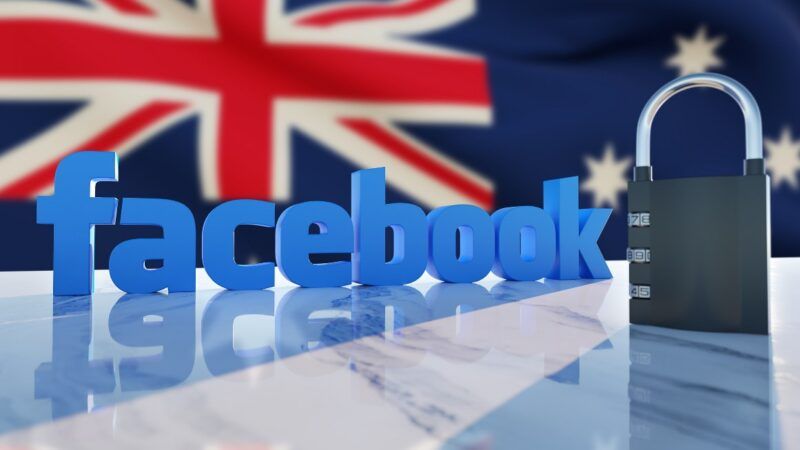Facebook Restores News Links in Australia After Getting Some Concessions
Big outlets get subsidies. The government still gets to pick winners and losers.

Facebook has relented, somewhat, in Australia. The social media company has worked out deals with three publishers in exchange for lifting a policy banning Australian Facebook users from linking to news stories from Australia-based outlets.
It's the latest salvo in a war over the financial disaster facing the press due to a loss of advertising revenue. The internet has overtaken traditional print outlets as the primary venue for classified advertising. Newspapers have struggled to fill this void. Many have failed.
There's nothing wrong with introducing a better way to advertise goods and services. But media companies and allied politicians have been treating Google and Facebook as though they've stolen money owed to publishers. And so there's been a push to require social media companies and search engines to make up that lost advertising revenue.
The tech companies have been resisting, noting that it's the media outlets that have been gaining with increased readership. While this is definitely true, it hasn't been enough to make up for the loss of ad money. So media outlets have been pushing governments to demand that tech companies subsidize them.
This hit a boiling point in Australia last month when Facebook found itself facing legislation that would force tech companies to pay for links to media outlets, with the amounts to be determined by compulsory arbitration. In response, Facebook simply stopped allowing users to share news stories from Australian media outlets. Facebook officials pointed out that their company is not Google, and that news sharing is not a significant source of its revenue or a major driver of Facebook use. The company's critics then inaccurately accused the social media giant of censoring an entire country.
A better description of Facebook's move would be "a negotiating stance." Last week the proposed law was altered so that the government can force arbitration only if the two sides can't come to an agreement, and then it was passed. That still gives government a lot of power to dictate the financial relationship between two private entities, but it seemed to be enough for Facebook. The company announced that it had signed letters of intent with three independent media outlets: Private Media, Schwartz Media, and Solstice Media.
The Associated Press observes that these deals also apparently come with promises to remove content from behind paywalls. That's a clever demand—if the media outlets are going to insist that they need Facebook money to survive, they shouldn't be blocking Facebook users from reading the content.
There is a big downside to these deals, beyond the fact that the government is forcing one industry to subsidize another. Not every media outlet is going to be offered these agreements, and the terms will almost certainly favor the larger media outlets. This will help entrench the media status quo and protect incumbents from upstart competition.
The New York Times reports:
Any news publisher with more than 150,000 Australian dollars in annual revenue could seek to register as a party to the code, giving it the ability to force a company like Facebook into a negotiation.
The law would also grant enormous discretion to the federal treasurer. Mr. Frydenberg would have the power to designate which companies must negotiate under the code's provisions, while also deciding which media companies were able to register.
It's a problem that government officials will have the power to decide who companies like Facebook and Google have to negotiate with. Nick Clegg, the former British deputy prime minister who is now Facebook's vice president of global affairs, has noted that the Australian law demanded that Facebook "pay potentially unlimited amounts of money to multi-national media conglomerates under an arbitration system that deliberately misdescribes the relationship between publishers and Facebook—without even so much as a guarantee that it is used to pay for journalism, let alone support smaller publishers."
Clegg also blasted News Corp. and conservative media mogul Rupert Murdoch for turning to the government to force Facebook into arbitration: "It is ironic that some of the biggest publishers that have long advocated for free markets and voluntary commercial undertakings now appear to be in favor of state sponsored price setting."
Facebook has warned that it could still shut news linking off entirely if it doesn't like a media outlet's terms, government arbitration notwithstanding. We'll have to wait to see if that actually happens.


Show Comments (14)